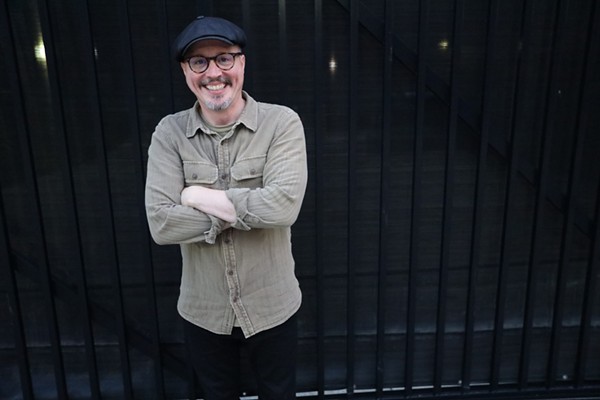Ryan Dillaha
Working-Class Musician

December 17, 2018
At a Sunday morning brunch at The Gaelic League in Detroit, Ryan Dillaha’s charming lyrics and biting humor were on full display. Combining his own material with a selection of classic singer-songwriter covers, Dillaha claimed the stage and enamored his audience. “Brunch costs twenty bucks, clapping don’t cost you nothing,” he joked between songs. He delivers his melancholy lyrics and heartfelt melodies with a smile and a wink. Dillaha has been playing music since he was young. He and his band have toured all over the Mid-Western United States, and are widely respected in the Michigan music scene. He was born in Dearborn, and grew up Downriver, just south of Detroit. Dillaha received all of his degrees at Wayne State University. He worked in a steel mill until he became an English professor at Oakland Community College.
“Being extemporaneous is my super power,” he said to me before settling down with a Mexican coke at the Dovetail in Warren. He wasn’t kidding, as without any rehearsing he answered each question insightfully and thoroughly. An intellectual English professor by day, and a drink-fueled rocker by night, Ryan Dillaha is the man to ask about the songwriting process, and the working-class-musician experience.
Guzman: What drives you to always want to write and perform music?
Dillaha: It’s always been a part of my identity. I teach English, so poetry and lyrics are always around me, which keeps it interesting. I’m a huge fan, and a teacher of the tradition of American letters, I’m trying to keep that tradition. Walt Whitman says, “the powerful play goes on, and you may contribute a verse.” It’s about having an identity in art; to say something in a way you can’t say it in conversation. It’s a sort of therapy, as well, to put your emotions and hard times that you go through into an expressive art form. And, of course, as I discover new songwriters, it puts gas in my tank and I’m inspired to find a new thing to express, or a new way to express old things. I’m always thinking that there’s one more (better) song.
Guzman: Being an English professor, do you find inspiration within the prose you teach, and within your students?
Dillaha: Absolutely. In fact, I would go so far as to say it is virtually impossible to be a good songwriter without a reading life. When I hear a song, I can sometimes guess if the creator reads or not. A replacement for the reading life could be a robust listening life, which would inspire ideas. But even the artists you’d listen to get their ideas from literature. Images, figures, rhyme schemes and so much more are constantly pulled into songs from literary traditions.
Guzman: What does the Detroit music scene mean to you?
Dillaha: It seems to me that we have to be doing it out of love here in Detroit. There’s no real money or fame to come of being involved in the Detroit music scene, it’s just a passionate community. All of us sound like ourselves. You have to find your own voice in this scene, or you fall through the cracks and it’s not enough. The history of this town is so saturated in moving things forward and creating new things, which shows in the way the songwriters of Detroit write and perform. We all try to give each other opportunities and network. We’re just a very tight, genuine community.
Guzman: You released your album, Miracles in Mono with your band (Ryan Dillaha and the Miracle Men) in 2015, what was the recording process like?
Dillaha: It was a blast. We went up to this converted horse barn in Mono, Ontario, which isn’t there anymore, I think ours was the last record recorded there. We just locked ourselves in there for a weekend with bologna and milk. It was a lot of fun. It was like a summer camp where we couldn’t get away from each other. We’d record ‘til the early hours of the morning, and sleep and wake up without an alarm. A lot of people get into music really young and want to be in a band. I didn’t fall in love with music for that aspect, I just wanted to write songs and express myself. Then I ended up in a band, and it was awesome. It’s such a brotherly bond. A lot of songs I write without thinking it could be a band song, but then the guys hear it and add parts and it becomes a rock and roll song. I write the lyrics, but with the band it becomes something different. Individually, we erroneously think when we write a song it’s only ours. But really, it’s the result of a whole collective over centuries of chord changes and literary strategies. With a band, though, you know it’s not your own. The guys turn songs into something more than I could ever conceive.
Guzman: What is it like to write songs for you?
Dillaha: I used to pay attention when I wrote to the rock and roll aspect. I’d try to write for the band, but doubt myself as to whether the songs were of that genre. I’d skip them and try desperately to come up with something specific. Then I realized I just had to write what came out, and assign the songs to their fate when it got that far. I took time off over the summer and wrote over 20 songs. I learned a lot about just letting it come, however my style of writing wants it to. Creativity isn’t guaranteed, I sat down every day for 3 hours to write, sometimes without anything coming out. But eventually I’d hammer out two new songs in 3 hours-you just have to keep trying and set aside time to work. You have to be there ready for it when it comes.
Guzman: Tell me about your song, “One For Me.”
Dillaha: That song is a perfect example of how inspiration finds you randomly. My girlfriend was living with me at the time, and we got in a big fight. She got angry and went to the bar, which was usually my move so I didn’t know what to do. I started thinking of all the pick-up lines she might hear at that bar. “There’s always one to buy her a beer, one to take her away from here.” I was just thinking of that, and pickup lines. I went for a walk to cool down, and I saw these three women on a night out. They were going toward a bar, it seemed like they were drunk already, and one of them kind of stumbled and the others caught her. I came up with the line, “stumbling through the parking lot gracefully.” After I said that line, I quick stepped it back to my porch, and before my girlfriend had gotten home I wrote the whole song. It’s rare when lines and ideas come out fully carved. That song felt crazy and amazing to write, it all just flowed out.
Ryan has just finished a 10-track solo record that will be out sometime in the near future, and is hoping to record an EP with his band soon. Keep on the lookout for his releases! You can find his previous material on Spotify under Ryan Dillaha, and his band under Ryan Dillaha and the Miracle Men.


